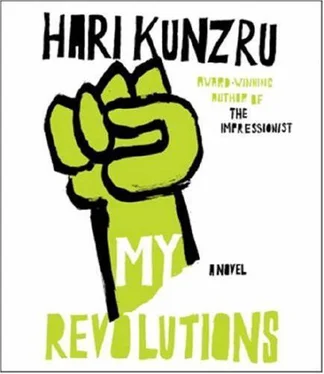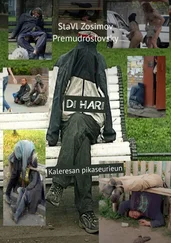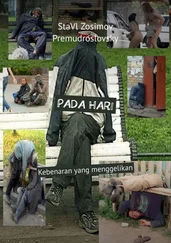themselves to reject that particular residue of the old world, who knew what other sentiments they might be harboring? After a couple more hours, Helen was in tears. Matthias tried angrily to leave, but we prevented him, blocking the door. It was one of our new rules that no one could leave a Criticism-Self-Criticism session until the group agreed it was finished. Nothing could be broken off. Every interaction, every interrogation, had to run until the bitter end.
So instead of complying with the will of the collective, Matthias and Helen had run away. The rest of us — eight or nine people, as I remember — met up in Wales, more or less convinced none of us had been followed. Outside, rain lashed at the windows as we tried to light a fire in the damp hearth. In the corner of the room a carryall contained the guns and explosives. Everyone was nervous and depressed, except Anna, who chain-smoked cigarettes and stared into the fire and talked, half to herself, half to the room. She approached the situation methodically. This wasn’t a problem. It was an opportunity, a chance for us to confirm our commitment to the armed struggle. Matthias and Helen had shown us they were objectively reactionary. Of course it was hard for us to accept. We’d loved them, treated them as our brother and sister, but they were pigs, end of story. They were pigs and now they’d gone. Things like this were to be expected. As revolutionaries, worse misfortunes would happen to us than losing a weak comrade like Helen. Once we became a serious threat to the state, we shouldn’t expect it to show us any mercy. It was important to know this, to know how strong we had to be. She proposed an answer. We should conduct a Criticism-Self-Criticism session to discover if anyone else was thinking of leaving or, worse, was working for the enemy. We had to nip our paranoia in the bud. Sean caught on quickly. We had to trust one another. It was, he agreed, the only way. That night he and Anna seemed to be marching in lock-step. They were thinking with one mind, finishing each other’s sentences.
Sean produced a sheet of blotter acid. By then the only drug we used with any regularity was speed and none of the rest of us liked
the idea of tripping in our anxious, mistrustful state. Sean argued that this was exactly why it was necessary. If we were going to break down barriers, everything had to be in play, everything out in the open. So we sat round the fire and swallowed our hits, washing them down with gulps of ice-cold water, drawn from the pump outside the kitchen door. Then, to my horror, Sean loaded a round into one of the pistols and put it on the rug in front of the fire, smiling beatifically.
“Now you’re just being stupid,” I told him.
“Why do you say that, Chris? Afraid you might use it? Afraid it might get used on you?”
“Of course I’m afraid.”
“He’s right,” said Anna. “Enough macho bullshit. It’s not going to help anything.”
But no one made a move to take the thing away, so it sat there on the rug and we stared at it until Anna told Leo she didn’t think he really believed in building the revolution and Leo defended himself and made a counteraccusation and gradually we were all drawn in, pointing, shouting, putting one another to the question, everyone an inquisitor, a Dzherzhinsky, a Beria strutting about in our psychedelic Lubyanka basement. I don’t remember much about what happened, except that it was frightening and sometimes physical and all night the gun sat there in the middle of the floor, radiating malevolent potential. We ruthlessly hunted down every molecule of Fascism and Imperialism in one another until at last it was daylight and we were all exhausted, shaking as we came down, finally convinced there were no traitors, that we were all committed and prepared to carry on. Claire made strong sweet tea and it tasted like life itself. I remember looking out of the window, feeling scoured, purified, my hands trembling as I held the mug.
That afternoon we went out walking across the hills, following a ridgeline high above the scribble of stone walls and sheepfolds around the farmhouse. I was beside Anna, the others straggling out ahead of us, making for a cairn of stones marking a nearby peak. We’d said very little, each lost in thought. On impulse I asked
her the question that kept echoing back to me. Miles’s question in the cells at Bow Street.
“What do you think it will look like?”
“What?”
“After the revolution. What kind of place will this be?”
“That’s not for us to know.”
“What do you mean, not for us to know? That just sounds like mysticism.”
“Not mysticism, historical process. It doesn’t matter what we think, because the future will be determined by the will of the masses, not a few individuals.”
“Sure, but you must think about it. What do you imagine, when you imagine it?”
“I don’t, Chris.”
“Why not?”
“Because I won’t see it, and thinking about it would make me sad.”
A couple of months later, we got a letter from Helen, postmarked Frankfurt, West Germany. It said she and Matthias had moved there to live in a Sponti commune. She was involved with a Kinderladen and Matthias was working for a magazine. They wanted us to know that in their opinion we’d started to reproduce all the worst forms of hegemonic domination in our conditioning. We should reconnect with the working class or risk succumbing to our latent group Fascism. Helen also wrote that she was pregnant. She hoped her child would be brought up in an atmosphere free of nihilism, safe from our perverse fascination with horror.
Pigs, I thought. Traitors.
* * *
The more the worker expends himself in work, the more powerful becomes the world of objects, which he creates in the face of himself, and the poorer he himself becomes in his inner life, the less he belongs to himself. Anna and I stand in an elevator on our way up the tallest building in Britain. It’s five hundred and eighty feet high. The elevator is traveling at a thousand feet a minute. I know a great deal about this building, the Post Office Tower. I know about the TV and telephone traffic it routes through powerful microwave transmitters. I know about the radar aerial at the top, designed for short-range weather forecasting. I know something about the layout of the upper floors, where this elevator is taking us. If I stare straight forward, my view of the steel elevator doors is barred at the periphery by the unfamiliar black plastic frames of a pair of glasses. I can see my reflection in the polished metal, not clearly, but as a kind of fuzzy impressionistic blur. The dyed reddish-brown hair, the gray smudge of my suit. Beside me Anna shifts from foot to foot, uncomfortable in her high heels. Her face is obscured by her wig, a curtain of long blond hair cut into a severe, unfashionable bob.
We have a dinner reservation at the Top-of-the-Tower revolving restaurant. Name of Beresford. I’ve eaten there once before. I’ve been to the viewing gallery and the cocktail bar. I’ve seen the arc of tables on the revolve next to the plate-glass windows, the three-tiered buffet displays in the center, stacked with dramatically lit piles of fruit and crudités. I know the location of the bathrooms and the emergency stairs. I know that this is the restaurant’s busiest night of the week.
The elevator stops at the thirty-fourth floor and we step out
onto an expanse of lurid blue and red carpet, woven with the restaurant’s logo. The whole place is blue and red. Red vinyl banquettes. Blue curtains. Blue tablecloths with red borders. We’re shown to our table by a man with a phoney French accent who introduces himself as Gustav. The menu is also phoney and French, snobbishly printed without translation. Screw you if you don’t know the difference between consommé au paillettes and créme d la reine . All the luxuries can be had at the top of the tower. Oysters and caviar. Sole in a champagne and lobster sauce.
Читать дальше












